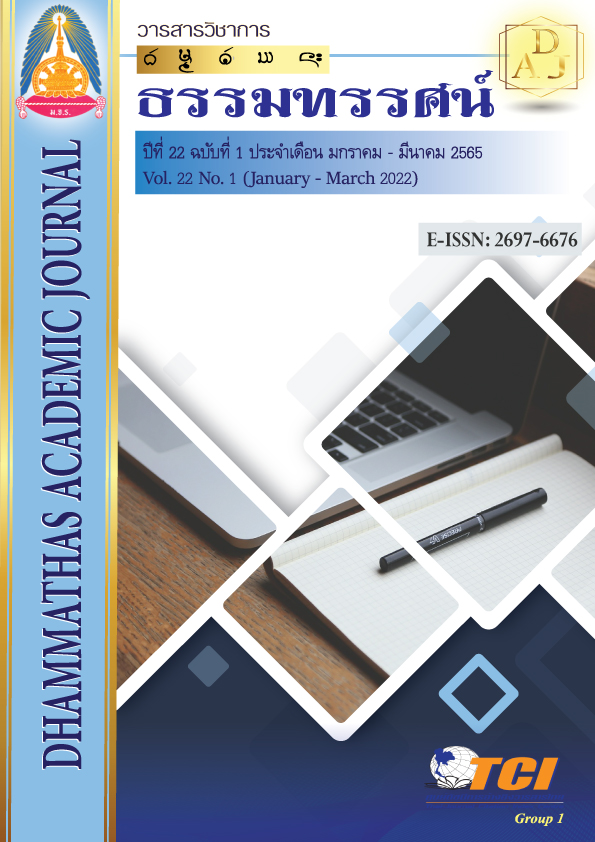นวัตกรรมและกลไกการพัฒนาศักยภาพสุขภาวะผู้สูงอายุโดยใช้ชุมชน ศาสนา และภูมิปัญญาล้านนาเป็นฐานในจังหวัดเชียงใหม่
Main Article Content
บทคัดย่อ
การวิจัยครั้งนี้ มีวัตถุประสงค์เพื่อ 1) สังเคราะห์การบูรณาการหลักธรรมและกิจกรรมทางพุทธศาสนาเพื่อเสริมสุขภาพและป้องกันโรคซึมเศร้าของผู้สูงอายุในจังหวัดเชียงใหม่ 2) สังเคราะห์การศึกษานวัตกรรมเชิงชุมชน สำหรับดูแลสุขภาวะผู้สูงอายุ โดยใช้ครอบครัวและวัดเป็นฐานในจังหวัดเชียงใหม่ 3) สังเคราะห์การพัฒนาศักยภาพด้านอาชีพจากผลิตภัณฑ์สมุนไพรภูมิปัญญาล้านนาของผู้สูงอายุในจังหวัดเชียงใหม่ และ 4) สังเคราะห์กลไกพัฒนาและส่งเสริมสุขภาวะผู้สูงอายุโดยใช้ชุมชน ศาสนา และภูมิปัญญาล้านนาเป็นฐานในจังหวัดเชียงใหม่ เป็นการวิจัยเชิงคุณภาพ กลุ่มเป้าหมายการวิจัยคัดเลือกแบบเจาะจงใช้แบบสัมภาษณ์ ประกอบกับการสนทนากลุ่มเป็นเครื่องมือในการเก็บรวบรวมข้อมูล ทำการสัมภาษณ์เชิงลึก นัดพบประชุม เก็บข้อมูลด้วยการบันทึกเสียงและจดบันทึกข้อมูล
ผลการวิจัยพบว่า
1. รูปแบบการประยุกต์ใช้การเจริญสติที่เหมาะสมกับผู้ที่มีภาวะซึมเศร้าได้แก่ หลักธรรมสันโดษ และกรรมฐาน
2. ผลการสังเคราะห์นวัตกรรมเชิงชุมชนสำหรับดูแลสุขภาวะผู้สูงอายุฯ พบว่า ครอบครัวและวัดเป็นฐานที่มุ่งเน้นการดูแลสุขภาพทางกายและจิตใจของผู้สูงอายุเป็นหลัก มีภาคีเครือข่ายให้ความช่วยเหลือและสนับสนุน
3. ผลการสังเคราะห์การพัฒนาศักยภาพด้านอาชีพจากผลิตภัณฑ์สมุนไพรฯ พบว่า พระสงฆ์เป็นศูนย์รวมจิตใจหลักร่วมกับปราชญ์ชุมชนที่มีความรู้ประสบการณ์ด้านแพทย์แผนไทย ก่อตั้งชมรมสมุนไพรจาวยอง
4. ผลการสังเคราะห์กลไกการพัฒนาและส่งเสริมสุขภาวะผู้สูงอายุฯ พบว่า เกิดกลไกผู้นำพระสงฆ์ กลไกการทำงานภาครัฐ กลไกทางสังคมของการช่วยเหลือกัน และกลไกอาสาสมัครในชุมชน ข้อเสนอแนะการวิจัย ควรสร้างกระบวนการมีร่วมกันจัดทำแผนการพัฒนาชุมชนผู้สูงอายุตามกลไกที่วางไว้โดยใช้ทรัพยากรที่มีอยู่ในชุมชนให้เกิดประโยชน์สูงสุด
Article Details

อนุญาตภายใต้เงื่อนไข Creative Commons Attribution-NonCommercial-NoDerivatives 4.0 International License.
เพื่อให้เป็นไปตามกฎหมายลิขสิทธิ์ ผู้นิพนธ์ทุกท่านต้องลงลายมือชื่อในแบบฟอร์มใบมอบลิขสิทธิ์บทความ ให้แก่วารสารฯ พร้อมกับบทความต้นฉบับที่ได้แก้ไขครั้งสุดท้าย นอกจากนี้ ผู้นิพนธ์ทุกท่านต้องยืนยันว่าบทความ ต้นฉบับที่ส่งมาตีพิมพ์นั้น ได้ส่งมาตีพิมพ์เฉพาะในวารสาร วิชาการธรรม ทรรศน์ เพียงแห่งเดียวเท่านั้น หากมีการใช้ ภาพหรือตารางของผู้นิพนธ์อื่นที่ปรากฏในสิ่งตีพิมพ์อื่นมาแล้ว ผู้นิพนธ์ต้องขออนุญาตเจ้าของลิขสิทธิ์ก่อน พร้อมทั้ง แสดงหนังสือที่ได้รับการยินยอมต่อบรรณาธิการ ก่อนที่บทความจะได้รับการตีพิมพ์เอกสารอ้างอิง
กรมอนามัย กระทรวงสาธารณสุข. (2563). ผู้จัดการการดูแลสุขภาพผู้สูงอายุ. เข้าถึงได้จาก http://www.anamai.moph.go.th/main.php?filename=Test_Index_201
คณะกรรมการผู้สูงอายุแห่งชาติ. (2564). แผนพัฒนาเศรษฐกิจและสังคมแห่งชาติ ฉบับที่ 12 พ.ศ. 2560 - 2564. เข้าถึงได้จาก https://www.nesdc.go.th/ewt_dl_link.php?nid=6422
ณัทธร สุขสีทอง. (2560). ภูมิปัญญาพื้นบ้านล้านนากับการเสริมสร้างสุขภาพผู้สูงอายุองค์การบริหารส่วน ตำบลสะลวง อำเภอแม่ริม จังหวัดเชียงใหม่. วารสารมหาวิทยาลัยคริสเตียน, 23(2), 164-173.
ดิลก บุญอิ่ม. (2562). การใช้หลักโยนิโสมนสิการแนวอริยสัจเป็นฐานการเรียนรู้ด้วยตนเองในการดำรงชีวิต. วารสาร มมร วิชาการล้านนา, 7(1), 72-81.
ปภัสสร กิมสุวรรณวงศ์. (2555). การดูแลสุขภาพแบบองค์รวมของผู้สูงอายุตามแนวคิดทางพระพุทธศาสนา. วารสารบัณฑิตศึกษาปริทรรศน์, 8(3), 19-42.
พระภูชิสสะ ปญฺญาปโชโต. (2562). การเสริมสร้างสุขภาวะตามหลักภาวนา 4 ของผู้สูงอายุในตำบลยางฮอมอำเภอขุนตาล จังหวัดเชียงราย. วารสาร มจร การพัฒนาสังคม, 4(1), 49-63.
พระอธิการสุชาติ จนฺทสโร, อาภากร ปัญโญ และดิลก บุญอิ่ม. (2564). วิถีพุทธ: การพึ่งตนเองด้วยการปลูกพืชสวนครัวของผู้สูงอายุในภาคเหนือ. วารสารปัญญา, 28(3), 30-46.
ภิรมย์ เจริญผล. (2553). ศึกษาวิเคราะห์หลักพุทธธรรมที่ใช้ในการดำเนินชีวิตของผู้สูงอายุ: กรณีศึกษา ผู้สูงอายุในสถานสงเคราะห์จังหวัดนครปฐม. (วิทยานิพนธ์พุทธศาสตรมหาบัณฑิต). พระนครศรีอยุธยา: มหาวิทยาลัยมหาจุฬาลงกรณราชวิทยาลัย.
มูลนิธิสถาบันวิจัยและพัฒนาผู้สูงอายุไทย. (2556). รายงานสถานการณ์ผู้สูงอายุไทย พ.ศ. 2555. สนับสนุนโดยกองทุนผู้สูงอายุคณะกรรมการผู้สูงอายุแห่งชาติ. กรุงเทพฯ: ทีคิวพี.
สุพาภรณ์ กันยะติ๊บ. (2560). หลักพุทธธรรมกับการสร้างเสริมสุขภาพของผู้สูงอายุ: กรณีศึกษา สถานปฏิบัติธรรมแห่งหนึ่ง. (วิทยานิพนธ์สาธารณสุขศาสตรมหาบัณฑิต). กรุงเทพฯ: มหาวิทยาลัยธรรมศาสตร์.

